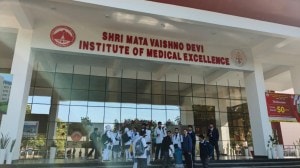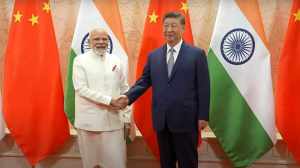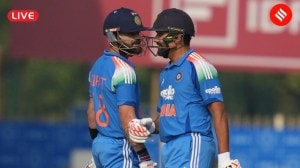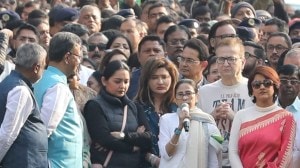The fallout and the falling out
There is the Rang De Basanti syndrome at work, anger against the political class as a whole. Though not a new trend, it is dangerous for any democracy. Mandal II shows that even our politics is becoming apolitical, with only losers in sight.

The more one searches for credible political rationale behind Mandal II, the more baffled it leaves you. It is only going to leave a trail of losers, not winners.
Congress leaders are certainly not convinced that it is going to benefit them politically. If anything, it is going alienate the upper castes and middle classes, which is agitated about the OBC reservations. Any plans that the party had about revival in Uttar Pradesh 8212; there had been feedback that the upper castes were looking at the Congress with new eyes 8212; will go for a six. The whole episode has sent a strong signal to UP, and other states, that it is identity politics that gets you what you want. Mainstream parties cannot swing it. That can be very damaging for a party like the Congress in the long run.
There are signs that 8216;8216;Plan Rahul8217;8217;, which envisaged him taking campuses by storm and mobilising youth, may have to wait. The atmosphere in the universities is so charged that Rahul may find it tough going but on the other hand, with polls due early next year, the Congress has no other weapon except Rahul in its armoury.
It has certainly done nothing for Manmohan Singh, otherwise the darling of the middle classes. They are unhappy with him for going ahead with Arjun Singh8217;s quota plan, and for not stopping him in his tracks before it became too late. The PM should have assessed the consequences of the 93rd Amendment. The Cabinet Secretariat, to which Arjun Singh had sent the draft bill, could have sat on it, instead of asking him to withdraw it, then sent it back, to be returned by the HRD Ministry unchanged.
The PM made the mistake of taking it to the UPA for endorsement, in the hope that he could first get the clearance for increasing the number of seats in institutions and then address the issue of 27 reservation in a phased manner. But things did not go according to plan as the UPA insisted on the 27 quota right away. They were not particularly concerned about an increase in the number of seats, now or later. Not one leader spoke differently.
Finally, as on other issues which threatened to get messy, the Supreme Court stepped in to give the government time and respite.
Though the BJP is the natural other pole to which the forward castes could gravitate, and for which they had voted till not so long ago, it too is compelled to be circumspect in its stand 8212; though in some places the ABVP is supposed to be helping the anti-reservationists. Having thrown out OBC leaders Uma Bharati and Kalyan Singh, the BJP has been accused of an anti-OBC bias and cannot survive on forward-caste votes alone. It had come to power in UP after the Ayodhya movement because the numerically large Most Backward Castes had backed the Ram movement. L K Advani8217;s Jinnah comments were also necessitated by the BJP8217;s need to go beyond its core support base.
The BJP has sought to take a somewhat different position from that of the Congress, in the hope of winning over the incensed, anti-reservation upper castes. It has given the move qualified support by suggesting the exclusion of the 8220;creamy layer8221; a suggestion that has also been mooted by the Left. The move could take the sting out of the agitation and go down even better if politicians8217; children were automatically excluded, given the 8220;super creamy layer8221; they represent, with their open exhibition of wealth at the weddings, birthdays of their children. The modalities would have to be worked out and linked not so much to income or tax criteria but a more comprehensive one to cover, for example, the agriculturalists who don8217;t fall in the tax net.
OBC-based parties, like the SP or the RJD or the JDU, are also unlikely to derive mileage out of it for the simple reason that they did not moot the idea 8212; unless of course a sharp polarization takes place like last time. But this is not likely given the stand taken by all parties.
As things stand, even Arjun Singh does not stand to gain much himself, such is the ire he has aroused in and outside the party. He has embarrassed the PM and possibly warded off a sack from the ministry, which he may have apprehended. But that is hardly an initiative expected from a veteran like Arjun Singh.
The movement, however, points to socio-political stirrings. It is not just an agitation against quotas but also an expression of anger against a situation of growing joblessness in the country. Else it would have been led by potential applicants to institutions of higher education, not medical students or doctors already 8220;in8221;.
There are states, including Maharashtra and Tamil Nadu, with more than 50 reservation for over a decade and without a whimper. The number of those benefiting from reservation in professional colleges in Maharashtra, for instance, runs into 3-4 lakh students every year, not the paltry thousand that Arjun Singh is talking about. It is well known that these states have had a history of social reform over a period, which made reservation acceptable and beneficial to the OBCs. In the North, it has been cataclysmic because both in 1990, when VP Singh went for Mandal, and now with Arjun Singh it has been perceived as nothing but a case of politics or politicking.
The backing of corporate houses and of the media cannot be the only thing that has sustained the agitationists, as some would like to believe. There is also the Rang De Basanti syndrome at work, anger against the political class as a whole. Though not a new trend, it is dangerous for any democracy. On the other hand, Mandal II shows that even our politics is becoming apolitical 8212; with only losers in sight.
- 01
- 02
- 03
- 04
- 05































